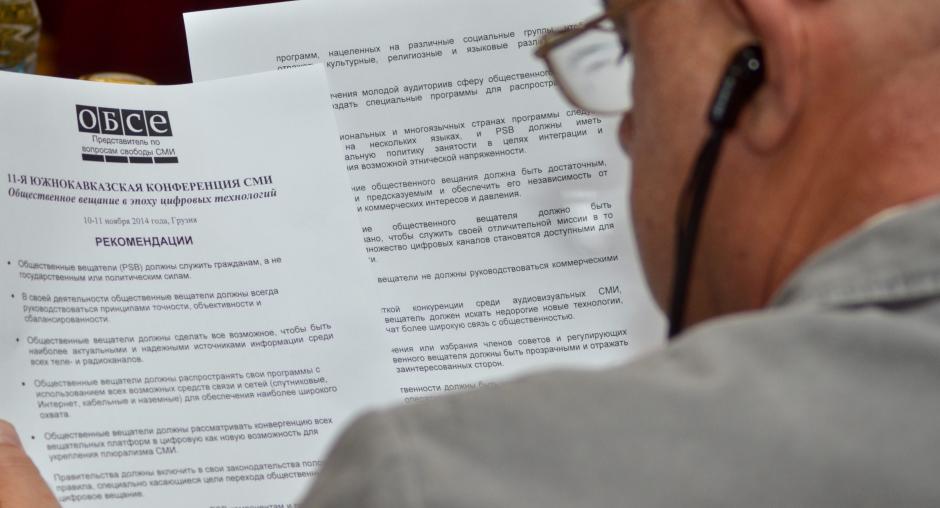Public service broadcasting’s vital role for advancing media freedom discussed at OSCE South Caucasus Media Conference in Tbilisi

TBILISI, 11 November 2014 – Public service broadcasting (PSB) is a vital element of democracy, and an important source of unbiased information and diverse political opinions, the OSCE Representative on Freedom of the Media, Dunja Mijatović, said in her closing remarks at 11th annual South Caucasus Media Conference in Tbilisi today.
“Public service broadcasting has played – and should continue to play – an important role for advancing media freedom in the South Caucasus region,” Mijatović said. “The unique feature of public service broadcasters is that they are controlled by the public, funded by the public and made for the public.”
The 11th South Caucasus Media Conference, entitled “Public Service Broadcasting in the Digital Age”, addressed the challenges, opportunities and strategic dilemmas for public service broadcasters in the digital age, and the latest media freedom developments in the South Caucasus.
The conference brought together more than 70 journalists, representatives of government, NGOs and academia from Armenia, Azerbaijan and Georgia, along with international experts and participants from Ukraine, Kyrgyzstan, Moldova and Kazakhstan.
The participants discussed the importance of overall influence and impact of new media technologies on PSB, including technologies such as digitalization, online broadcasting, digital interactivity, and cross-platform and multimedia production. Ways to ensure the independence of public service broadcasters and different funding models were also subject for discussion at the conference.
“With digitalization, online broadcasting, digital interactivity, and both cross-platform and multimedia production, public service broadcasters are at a crossroads. However, pluralism of opinions must be preserved at all times,” Mijatović said.
The recommendations from the conference will be published at www.osce.org/fom shortly after the conference and distributed to the authorities of the relevant OSCE participating States.
During her visit to Tbilisi, Mijatović also met with Chair of the Parliament David Usupashvili to discuss current media freedom issues in Georgia, including the future of the Georgian Public Service Broadcaster (GPB), the digital switchover process, and the challenges faced by Rustavi 2 television channel.
“Developments around GPB remain among the issues I continue to follow closely. I am pleased to note that seven new members of the Supervisory Board were elected allowing the broadcaster to continue fulfilling its important role in the society,” Mijatović said. “I urge the Parliament to elect the remaining two members soon to make the GPB fully operational.”
Mijatović was pleased to note that Georgia has made significant progress in moving the digital switchover process forward, including outlining a timeline and specific actions required by various stakeholders.
Mijatović also expressed concern about reports that the office of Rustavi 2, one of the largest television channels in Georgia, was under video and audio surveillance. In May, the Representative raised the issue with the Georgian Foreign Ministry.
“I hope the investigation launched by the law enforcement will soon bring the perpetrators to justice, as such illegal activities impede on media freedom and has a negative effect on the journalist profession in Georgia,” Mijatović said. “I will continue to follow this case closely.”
The OSCE Representative on Freedom of the Media observes media developments in all 57 OSCE participating States. She provides early warning on violations of freedom of expression and media freedom and promotes full compliance with OSCE media freedom commitments. Learn more atwww.osce.org/fom, Twitter: @OSCE_RFoM and on facebook.com/osce.rfom.
